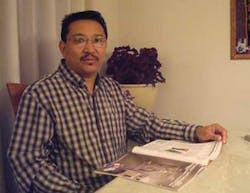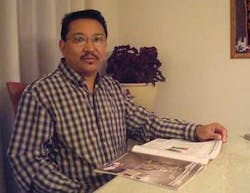The nomad from Tibet
Wisconsin hygienist views career as, well, like winning the lottery
by Judith E. Sulik, RDH, MBA
Trinley Namgyal calmly and quietly explains how a series of serendipitous events took him from his native Tibet to India to France, and eventually to Madison, Wisconsin. While he speaks very matter–of–factly, his listeners sit with mouths agape.
In 1962, when he was a few months old, Namgyal and his family fled across the border to India, where they lived as nomads until he was 15 years old. The area was in the remote and mountainous countryside where industry was basically nonexistent, and there was no hospital or school. “Because of the Chinese problem (Tibet had a contentious relationship with China, which took control of the country in 1959), there was no school until 1975, when the Tibetan government in exile started a Tibetan children's Village School in the Choglamsar region of Ladakh,” Namgyal said. “I started first grade when I was 15, and I didn't even know the alphabet. I was taught English in high school, but the school was in a remote location and the teachers weren't very qualified. They would read the English text and then explain it in Tibetan. No one spoke English in the classroom.” Because he learned quickly, Namgyal was given double grade promotions.
Then one day the school's director asked him if he would be interested in going to France to study dentistry. There was one scholarship available, and while he had never considered dentistry as a career, he immediately accepted. The French Dental Association trained students so they could return to their communities and run dental clinics sponsored by Aide à L'Enfance Tibétaine. Namgyal spent one year learning how to do check–ups, cleanings, fillings, and extractions — while learning to speak French — and then brought his knowledge back to India.
A clinic, which was supplied with products sent from France, was opened at the school Namgyal had attended. He estimates about 2,000 children attended the school, mostly orphans, and it had 200 staff members. He was responsible for the dental clinic, and ultimately became its director. He returned to France in 1989 for another year of training, and eventually spent six years at the clinic before another serendipitous event again changed his life's direction.
“In 1992, the United States government announced it would accept 1,000 Tibetans by lottery selection,” he said. “I wasn't considering entering the lottery, but my friends were and they encouraged me to submit my name. About 5,000 people applied, and I was one of the people selected.”
And that's how he ended up in Madison, Wisconsin, practicing dental hygiene at Midwest Dental Center. Well, the route wasn't quite that direct.
“I was given a sponsor in Madison and I lived with her for two months while I looked for a job and my own place,” he said. “I was one of 81 Tibetans who eventually settled in Madison and part of the last group of immigrants. I thought I'd be able to get a dental assisting job, but when I applied, I was told I needed a license. I gave up looking and was able to get a job in a dental lab. I worked there for five years and saved money to go to dental hygiene school. I was accepted at the Madison Area Technical College, but I was wait–listed for a couple of years. I was also fortunate enough to be awarded a scholarship through the Chenrizig Fund, a charitable nonprofit organization assisting Tibetan refugees in the U.S. and abroad. I graduated in 2001, was hired by Midwest Dental Center, and I've been there ever since.”
Practicing dental hygiene in the United States has little in common with the dentistry he practiced in India. “In India, I would see about 25 patients a day,” he said. “There was no paperwork, and the goal was to solve the patient's problem. Here we take a medical history and have to worry about liability. Medication is used here. There, hardly anyone gives medication.”
Namgyal is happy he decided to become a dental hygienist, and he does not see any more moves in his future. Fully integrated into American society now, he retains a relationship with his Tibetan heritage through his involvement with the Wisconsin Tibetan Association, which provides support as well as political and social activities.
Judith E. Sulik, RDH, MBA, is president of Finally Finished Press of Middleton, Wis. She recently published a cookbook based on Madison, Wisconsin–area restaurants. For details, contact her by e–mail at [email protected].

